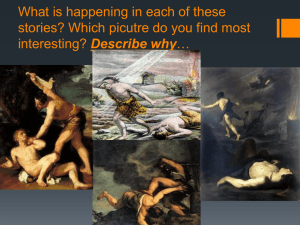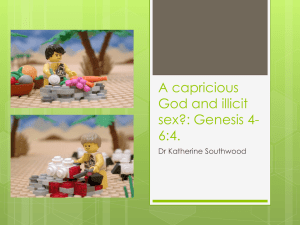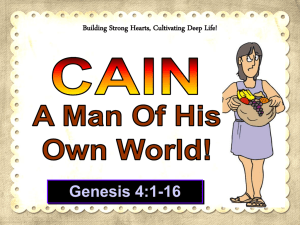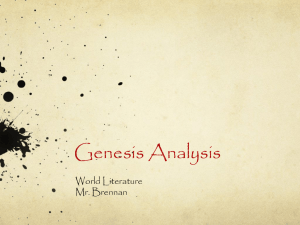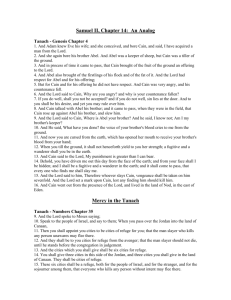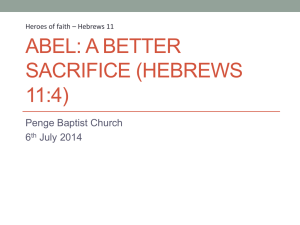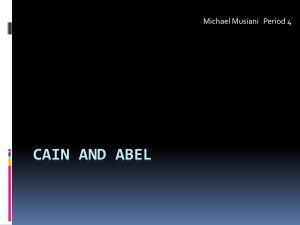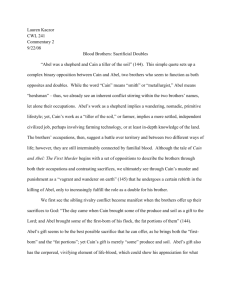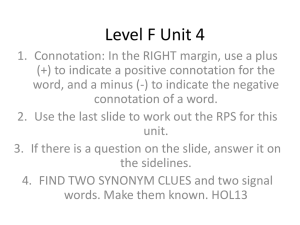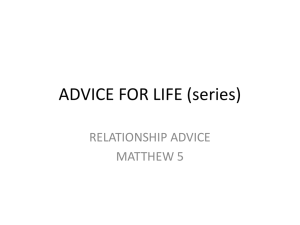Cain, Abel, Seth and the meaning of human life as portrayed in
advertisement
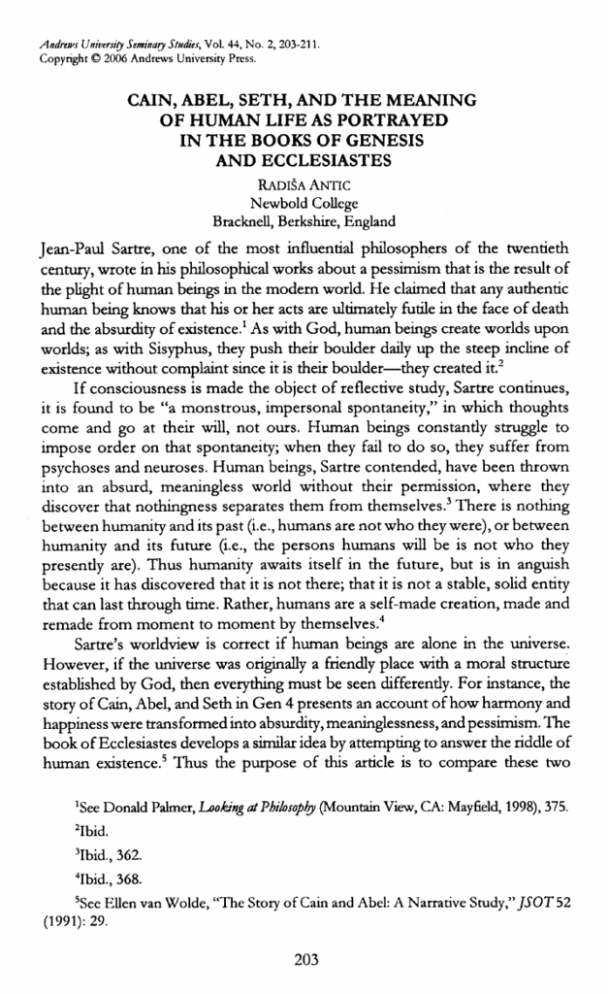
Andmjs UnivtmiO Seminay S/I~&CS, Vol. 44, No. 2, 203-31 1. Copyright O 2006 Andrews University Press. CAIN, ABEL, SETH, AND T H E MEANING OF HUMAN LIFE AS PORTRAYED I N T H E BOOKS OF GENESIS AND ECCLESIASTES RADISA ANTIC Newbold College Bracknell, Berkshire, England Jean-Paul Sartre, one of the most influential philosophers of the twentieth century, wrote in his philosophical works about a pessimism that is the result of the plight of human beings in the modem world. He claimed that any authentic human being knows that his or her acts are ultimately htde in the face of death and the absurdity of existence.' As with God, human beings create worlds upon worlds; as with Sisyphus, they push their boulder daily up the steep inche of existence without complaint since it is their boulder-they created it.2 If consciousness is made the object of reflective study, Sartre continues, it is found to be "a monstrous, impersonal spontaneity," in which thoughts come and go at their wdl, not ours. Human beings constantly struggle to impose order on that spontaneity; when they fail to do so, they suffer from psychoses and neuroses. Human beings, Sartre contended, have been thrown into an absurd, meaningless world without their permission, where they dscover that nohngness separates them from them~elves.~ There is nothmg between humanity and its past (i.e., humans are not who they were), or between humanity and its future (i.e., the persons humans will be is not who they presently are). Thus humanity awaits itself in the future, but is in angush because it has discovered that it is not there; that it is not a stable, solid entity that can last through time. Rather, humans are a self-made creation, made and remade from moment to moment by them~elves.~ Sartre's worldview is correct if human beings are alone in the universe. However, if the universe was originally a friendly place with a moral structure established by God, then everythmg must be seen differently. For instance, the story of Cain, Abel, and Seth in Gen 4 presents an account of how harmony and happiness were transformed into absurdty, meaninglessness,and pessimism.The book of Ecclesiastes develops a similar idea by attempting to answer the riddle of human existence.' Thus the purpose of this article is to compare these two 'See Donald Palmer, Looking at Phihopby (Mountain View, CA: Mayfield, 1998), 375. 'Ibid. 31bid.,362. 41bid.,368. 5SeeEllen van Wolde, "The Story of Cain and Abel: A Narrative Study,"JSOT 52 (1991): 29. passages in Scripture, showing how the characteristics portrayed respectively by Cain, Abel, and Seth reappear in the book of Ecclesiastes. The Meaning ofthe Names "Cain, " 'Hbe/,"and 'Yetb" and Their Theologcal Significance in Genesis 4 In biblical times, a name was not merely a label, but often referred to its bearer's reputation and power (cf. Mark 6:14; Rev 3:l) or to h s or her character (cf. Ps 68:4; Isa 25:1).6 For instance, 1 Sam 25:25 describes the relationship between the name and character of a person: "Nabal . . . is just like h s name-hs name is Fool, and folly goes with him." Additionally, the name of God and his being are often used interchangeably, thus expressing their essential identity: "Therefore I dpraise you among the nations, 0 Lord; I will sing praises to your name" (Ps 18:49).'John 3:18 proposes that believing in Jesus' name is the same as believing in Jesus himself. Therefore, Jesus is like his name, which means "Savior" (Matt 1:21).Thus it seems obvious to assume that the names "Cain," "Abel," and "Seth" are used carefuliy in Gen 4 to communicate an important theological proclamation about the gloomy reality of human existence and, at the same time, to suggest a possible solution for the problem of meaninglessness. Cain Some OT scholars have expressed a certain uneasiness in philologically relating the wordgay to qanah ("to acquire, to possess, to get"), arguing that the word gin ("smith or worker in metal") fits the context of Gen 4 much better.* However, it seems that the mentality of "possessing," "acquiring," and "getting7' adequately expresses the character of Cain, as well as his actions, in Gen 4. 1. A new worktview. First, Cain possessed or acquind his own conception of how God should be worshped and s e r ~ e dHebrews .~ 11:4 points out that "by faith Abel offered to God a more acceptable sacrifice than Cain," suggesting that the different motives of the two brothers, known only to God, account for their different treatment.'' Their motives were also reflected in the quahty of their gfts. The biblical text says that Cain simply offered "some produce of the land," whereas Abel offered the choicest animals from his flock-"firstltngs" and "their fat portions" (Gen 4:4). By committing the original sin, Adam and Eve refused to accept the state of created beings; by eating the forbidden fruit, they acknowledged to God that they 'Cf.R. Youngblood,"Names in Bible Times, Significanceof," EvangelicalDictionay of Theology, 750. 'L. Hicks, "Cain," The Interpreter's Dictionary ofthe Bibh, 1:482. 'See Gordon J. Wenham, Genesis 1-15, WI3C 1 (Waco: Word, 1987), 104. "Ibid. CAIN,ABEL,SETH,AND THE MEANINGOF HUMANLIFE.. . 205 wanted to be a law to themselves. However, it seems that the intensity of their rebellion is less in degree compared to that of Cain's. The intensity of Cain's passionate rebellion is expressed: "Cain was very angry" (Gen 4:5)-a state of mind that is often a prelude to homicidal acts. God's questions, 'TVhy are you angry?'and "Why is your face fallen?" are parallel to the questions addressed to the man in Gen 3 ("Where are you?' 'Wrho told you that you were naked?'and "Have you eaten from the tree that I commanded you not to eat &om?" w. 9, 11). In Cain's case, the questions were intended to provoke a change of heart. Nevertheless, Cain was not dissuaded from his murderous intent by the Creator's demand (Gen 4:4-6). While Adam, Eve, and the serpent accepted God's verdict of punishment without anger (Gen 3:14-20), Cain protested, saying that he was being treated too harshly (Gen 4:14).11 Thus it seems obvious that, for the author of Genesis, the murder of Abel is not simply the reappearance of the original sin, but is rather a progressive development:"Sin is more f d y entrenched and humanity is further alienated from Cainpossessed a new worldview that is radically opposed to God, and by using h s sinful mind he acquiredan understanding that he could be a law to himself. 2. A brother. Cainposmed a brother. In Gen 4, Abel is called the brother of Cain, but Cain is never referred to as the brother of ~ b e 1 . The I ~ use of the possessive pronouns "hs" (i.e., brother, w. 2, Ba, Bb), "your" (i.e., brother, w. 9,10,1 I), and "my" (i.e., brother, v. 9) demonstrates that Cain neither behaved as a brother nor acted as a brother toward Abel.14 In w. 6 and 7, God reproached Cain for not l o o h g directly at Abel (since to look at someone is a way of expressing good relationship) and for lying in ambush for him b e a wild animal prowling for prey. Here sin is personified as a demon crouchmg hke a wdd beast on Cain's doorstep. Although Cain did not raise his head to look at his brother, he "raises h s body from its ambush and jumps on h s prey like a wdd animal . . . and kills in one savage attack."I5 Consequently, Cainpossessed not only a new understanding of the role of man in the universe and his relationship to God, but he alsopossesseda brother. Thus the Gen 4 narrative records the further deterioration of humanity from its original perfect state. In Gen 3, when Adam was confronted with his sin, he told the truth, at least partially: "I heard you in the garden, and I was afraid because I was naked; so I hid" (Gen 3:lO). On the other hand, Cain told a complete lie. When asked where his brother was, he replied, "I don't know," then sarcastically added, "Am I my brother's keeper?'(Gen 4:9). "See Wenham, 100. 121bid. 13Wolde,33. 141bid. 151bid.,35. 3. A Jpecialmark ors&qn.Cain acq~inda special sign of protection: "the Lord put a mark on Cain" (Gen 4:15). The question of the nature of Cain's mark has been the object of endless discus~ion.'~ Some commentators argue that the mark of Cain must have been something that would demonstrate that he had &vine protection and would thus deter would-be attackers. It could have been, according to them, a special hair style, a tattoo, or a dog that accompanied hun on his wanderings, whch served not only to reassure Cain of God's protection and to scare off any attackers, but also as a wild forebodmg appearance that frightened his would-be assadants." W e "the precise nature of the sign remains uncertain, . . . its function is clear."" The sign placed on Cain served to remind him of his sin and God's mercy, in the same way that the clothing given to Adam and Eve after the Fall served as a reminder of God's continued care for humanity (Gen 3:21).19Thus whatever the real nature of the mark of Cain was, it seems obvious that God was stdl attempting to reach Cain's heart. By expressing his love and protection, God was trying to change the being of Cain, which was permeated by hatred and petrifted in rebellion. 4. A land. Cainpossessed a land: "Cain went out from the Lord's presence and lived in the land of Nod" (Gen 4:16). It remains uncertain where the land of Nod was geographically located? but this is not of vital importance for the meaning of the text. "Nod" means "wandering," a meaning that underscores that Cain was to leave God's presence-to go away from the garden of "delight" to become a "wandering vagrant." Sin separated hun from the presence of his Creator. However, the possession of the land of Nod also gave Cain apparent security, as well as a future. The "land of wandering" became the symbol-type for the residence of all those who rebel against God. 5. A mi.Cainposmed a wife. There have been many questions about the o r i p s of Cain's wife. It seems obvious that the text before us is not an official record or a "famdy tree," gving all the details of Adam's famdy. Genesis 5:4 says that "Adam bore sons and daughters," thus in&cating that Cain had sisters, nieces, and grandrueces.Thus Cain's wife was, most likely, hls sister. Although it is not certain who Cain's wife was, what is important for this study is the fact that Cain acquired a wife and, thereby, the apparent security of farmly life, happiness, and a future. 6. A son. Cain alsopossessed a son, whose name was Enoch. Whle "Enoch" and "Lamech" are the only two names in the Gen 4 genealogy that reappear in the genealogy of Adam via Seth (Gen 5), enough details are given in both 16SeeWenham, 109. "Ibid. I8Ibid.,1 10. '"bid. 20The text indicates that Nod was located east of Eden. It is possible that while Adam and Eve remained in the general area of the Garden of Eden, Cain could not stay there and had to go eastward. CAIN, ABEL, SETH,AND THE MEANING OF HUMAN LIFE.. . 207 genealoges so as not to confuse them.21Thus Cain had a posterity since Enoch will have his own children. 7. A Cainpossesseda city. According to some commentators, the name of the city sounds like "Eridu," which, according to Mesopotamian tradition, is the oldest city in the w ~ r l dBuildmg .~ a city was an attempt by Cain to thwart the penalty God had imposed on him and to establish a place of safety for his family? As a result of God's mercy in response to his sin, Cain possessed a new concept of worshiping God, a brother, a special sign of protection, a land, a wife, a son, and a city. He secured his future and lived an apparently meaningful life, but he lived his life independently of God. Human life without God seems to have meaning; opposition to God has proven to be rewarding. Evil and all those who have incorporated it in their lives will, accordmg to Cain's experience, rule the world. But what about those who are faithful, true sons of God? Abel Abel's name Hebel ("breath, vapor, vanity")24stresses the transitory nature of human life, the sense of transience and worthlessness. It also emphasizes the fact that in the eyes of other people Abel did not amount to much." When he was born, he was called the "brother of Cain," and even after that event he was constantly referred to as "the brother," "Abel h s brother," "Abel your brother," "my brother's keeper," "your brother's blood." Abel is a brother; yet "he does not have a brother, he is a brother only."26 The presence of Abel in Gen 4 is reduced to a minimum. His only action in the narrative was that of making an offering to the Lord. He did notpossess a worldview that was opposed to God, a brother, a sign of protection, a land, a wife, a son, or a city. He appeared on the scene almost silently;without saying a word, he disappeared like "vapor" or "breath." His life gives the impression of being meaningless, absurd, sheer transience, worthless. Although he was obedient to God and God looked favorably on his offering, h s existence seems to be nothing but vanity. Although he was the true brother, the future apparently did not exist for him. Pessimism and meaninglessness continued to grow and progress as human history unfolded. While in Gen 3 sin lsrupts the relationships between God and humanity and between husband and wife, in Gen 4 the separation from 21Wenham,110. Cf. Travis R. Freeman, "A New Look at the Genesis 5 and 11 Fluidity Problem," AUSS 42 (2004): 259-286. 22Wenham,110. 'see G. C. Aalder, Genesis, Bible Student's Commentary 1 (Grand Rapids: Zondervan, 1981),121. 24L.Hicks, "Abel," The Intelpreter?Dictionaty oftbe Bible, 1:4. *'See Wolde, 29. God introduces hate of one brother for another: "Cain is portrayed as a much more hardened sinner than his father. Adam merely ate the fruit gven him by hls wife; Cain murdered h s brother."27 The author of Gen 4 further emphasizes the progression of evil in the world in conjunction with the disappearance of good (epitomized in the personality of Abel) by comparing Lamech to Cain: "Cain will be avenged sevenfold, but Lamech seventy-sevenfold."The barbarity of humanity infected by the virus of sin is portrayed here; Lamech was "even more depraved than his forefather Gain."*' Although Noam Chomsky writes from an atheistic perspective, he adequately describes the progressive self-destruction of humanity: mhe answer can only be that humans were a kind of "biological error," using their allotted 100,000 years to destroy themselves and, in the process, much else. The species has surely developed the capacity to do just that, and a hypothetical extraterrestrial observer might well conclude that humans have demonstrated that capacity throughout their history, dramaticallyin the past few hundred years, with an assault on the environment that sustains life, on the diversity of more complex organisms, and with cold and calculated savagery, on each other as well.29 Cain's sin remains with humanity today. Genesis 4 reveals that humanity is heading toward self-destruction. Sin is an active, suicidal power, opposed to the principle of creation. God has brought forth, created something out of nothing; sin, on the other hand, transforms God's creation into nothing. Probably the greatest contradiction of sin is that in the process of destroying the world, it also destroys itself. Seth Only in Gen 4:30, when it would be expected that humanity would hally be destroyed due to its rebelhon agmst God, does hope suddenly reappear with the birth of Seth (Gen 4:25,26). His name is derived from the verb sbitb, meaning "to place, put," and suggests the idea of a sub~titute.~' Thus the birth of Seth, the meaning of h s name, and, importantly, the fact that humanity called on the name of the Lord are elements that point to the only possible solution for a planet of rebels. Eve says that Seth was gven to her as GodSgraciou.rg@, "instead of Abel, because Cain killed him" (Gen 4:25). Eve "can as little forget the murdered as the murderer, for both were her chddren and in one sentence she mentions the name of all three sons."31 *'See Wenham, 117. 281bid.,114. 29NoamChomsky, Hegemony or Szmival (New York: Holt, 2003), 2. %. Hicks, "Seth," The Interpreter's Dictionary ofthe Bible, 4294. 31Wenham,115. CAIN, ABEL.SETH.AND THE MEANING OF HUMAN LIFE.. . 209 With the coming of the Flood (Gen 6-8) came the destruction of all the descendants of Cain. Cain's posterity, the symbol-typeof the man who wanted to be a law to himself and to live independently from God, was completely destroyed. Only the descendants of Seth, the one whom God put in place of Abel, survived the Flood. 'Eueything iis Meaningleisis': The Rehtioniship ofEcc&iastesto Genesis 4 The claim that the author of the book of Ecclesiastes was deeply influenced by Gen 4 is not without foundation. For instance, Jacques Chopineau notes the relation between the name "Abel" in Gen 4 and the word hebelthat is found at the heart of Eccle~iastes.~~ The word hebel is used not only by the author of Ecclesiastes, but also by Isaiah and Jeremiah. As seen above, it is also the proper name of Abel, the son of Adam." Chopineau concludes that the influence of the early chapters of Genesis on the book of Ecclesiastes was intenti~nal.~~ In the same line of thought, Andre Neher explains that the word hebel primarily designates a person who, from the outset, was given a special, unusual destiny, that is, to disappear like breath and Neher demonstrates the close thematic and theologcal relationshp between Gen 4 and the book of Ecclesia~tes.~~ Jacques Ellul also argues that "the meaning of hebelin Genesis is especially important, since Qohelet continually refers to Genesis. . . . Habelevolves from a concrete to an abstract meaning: it is 'lexicalized metaph~r."'~' The author of Ecclesiastes used the word hebelthirty-eighttimes-more than all the other books in the Bible combined-thereby giving the word the character of a leitmotiv in the The author of Ecclesiastes used nearly all the nuances of hebel to express transience or the vanity of human existence.39The phrase babel h a b a h means "utter meaninglessness," "utter frustration," or "utter futility." At the end of Ecclesiastes, "the words of the wise" are "given by one shepherd" (12:11), which may also be a reference to Abel. Chopineau states that the term "shepherd" was carefully chosen by the author of Ecclesiastes to "Jacques Chopineau, "Henden Hebreu Biblique: Contribution 21 l'Etude des Rapports Entre Shantique et 1'Exkgi.se de l'Ancien Testament7'(Ph.D. dissertation, University of Strasbourg, 1Wl), 145. "Ibid. 35AndreNeher, Notes surQohelkl (L'Ecclesiarte) (Paris: Minuit, 195I), 7 1-79. 361 bid. ''Jacques Ellul, ReasonforBeing (Grand Rapids: Eerdmans, 1990),54. 38Theologial Dictionary ofthe OM Testament, S.V."Hebhel; Habhal." 39SeeWolde, 29. designate, fust, the wisdom of the one who leads his flock and, second, to Abel's oc~upation.~' Although the dominant word in Eccl 1 is bebel, in chapter 2 the prevailing words are "I planted" (v. 4), "I built," (v. 5), "I bought" (qanah, v. 7), "I amassed" (v. 8), and "I acquired" (v. 8), clearly showing that the character of Cain is also present in the author of Ecclesiastes. Neher states that "when all the great works are described, they are designated by the verb qanah (2:7), the root of the name 'Cain' (qyin)."" According to Neher, Cain possessed, acquired, and represented permanence." Jacques Doukhan proposes that Cain represents an antithesis to Abel. As the fust child of the family, Cain established hunself as a brutal leader. He had successors, built a city, cultivated land, and acquired possessions-activities that are also found in Eccle~iastes.~~ Thus it is obvious that the author of the book of Ecclesiastes is referring to the mind-set of Cain, as opposed to that of Abel. After having described the mentality of Abel in Eccl 1 and that of Cain in chapter 2, the author expresses one of the most puzzling dilemmas in human existence: 'Yet when I surveyed all that my hands had done and what I had toiled to achieve [the mentality of Cain], everythmg was meaningless [the perception of Abel]" (Eccl2:ll). However, is Cain really equal to Abel? Does this equation adequately describe human life on this planet? It seems clear that both the way of Cain and the way of Abel are ultimately meaningless. Both wisdom and folly are followed by death. Cain7sgreat accomplishments of possession are also hebe/. Doukhan writes that "Cain finishes like Abel. All the energy,wdl to create, to possess, led to the flood. Nobody from the family of Cain survived. If we attempt to Abel. J u d p g establish the end result, Cain arrives to the same point like [~iij by the end, Cain = Abe1.'744 Is there any hope "under the sun?' As in Gen 4, where the birth of Seth, "God's gracious gift," brought hope, so the expression "the gift of God" appears as a regular refrain in Ecclesiastes (3:13; 5:19; only "gift" in 5:l; "from the hand of God," 2:24; "that God has given you under the sun," 9:9). Doukhan states that although there may not be any hguistic connection between Gen 4 and Ecclesiastes, there is a thematic one.45The key statement at the beginning of the book, "eueything is hebe/' (bakhol babel, 1:2), finds its parallel at the end of the book, "kbol haadam" ("the whole of man," 12:13). If human history has come to a state of total self-destruction and annihilation 43JacquesDoukhan,"La 'Vanite' dans 17Ecclesiaste-Notes d7Etude,"Skr, 1997,30. February CAIN,ABEL,SETH,AND THE MEANINGOF HUMAN LIFE.. . 211 (Abel), it is necessary to restart everythmg (Adam). Seth, who was given "in place of Abel" as God's gift, was the only son to carry on the line of Adam, thereby completingAdam's genealogy. He was the only son to truthfully reveal the image of Adam (Gen 5:3). Thus, in order to recover the image of God lost in Abel and distorted in Cain, humanity must begin again from point zero.46By stating that "everything is Abel" and by concludingwith "everything is Adam," the author of Ecclesiastes speaks about the only possible solution and hope for humanity, that is, the new-birth or new-creation experience that comes from God. The new world and the new man must be put in place of the present one. Neher sees a clear allusion to Seth in Eccl 4:15 and thus translates the verse: "I have seen all who live, who walk under the sun: with the second child, the one who stands in his place."47Doukhan, who concurs with Neher, states that the "second son," who stands in place of the first, is an allusion to Seth as a substitute. For Doukhan, the language seems to become messianic, as in Gen 3:15 and 4:23, with reference to the Seed. In Ecclesiastes, this "second son," whle lung, is yet rejected, as the later generation does not rejoice in h ~ m . ~ ~ As it was God who granted to Eve "another child in place of Abel," so, in the same way, a solution must come from God. God will put another world in place of this world. God has promised that he will put enmity between the serpent and its posterity and the woman and her posterity, and that, finally, the serpent's head will be crushed by God hunself, who took on human nature, thereby becoming the second Adam (Gen 3:15; Eccl 12:13). Thus the meaninglessness brought into the world through Cain's murder of h s brother is forever revoked by the death of Jesus, the second Adam.
